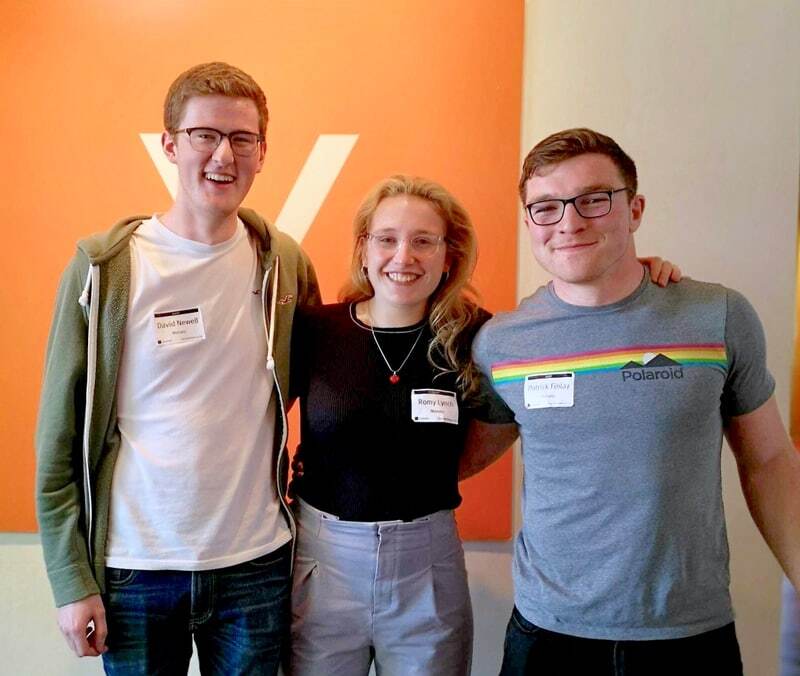Trends
The Passion Economy:
The Next Big Growth Industry?
Much of the economy has been turned upside-down by the Covid-19 pandemic, prompting many to look to hobbies as a means of generating an income. Lucy Ingham explores the potential of the passion economy, and why it is attracting investors amid the pandemic, with help from Patrick Finlay, CEO of Quorum

Make money from the thing you love doing: that is the dream of many of us, and the central focus of the emerging passion economy. And while it may sound far-fetched, it is increasingly becoming a reality for many.
From crafters selling their work on Etsy to creators building a fanbase on YouTube, the passion economy is enabled by the many-to-many environment that the web and its surrounding ecosystems provide.
“It's a way for people to monetise the thing that they are uniquely able to do and are uniquely passionate about,” explains Patrick Finlay, CEO of Quorum, a startup catering to the passion economy.
This is in contrast to the gig economy that has increasingly dominated the 2010s, where workers are defined as contractors rather than employees, and are at the whim of companies such as Uber and Instacart. In both economies, it is possible to make money through your phone, says Finlay, but under the gig economy the power is with the companies.
“There's a race to the lowest price, and the lowest bidder wins,” he explains.
“Whereas the passion economy, when you're providing your service, it's something and only you, really, can do, and because of that you can charge a premium. So it's a way of becoming economically active while doing something that you love.”
“While for many of us, lockdown was an endless stream of Netflix binges, for others it was an opportunity to spend time developing an existing hobby into a revenue stream...”
The passion economy has been gaining ground for some time, with market leader Patreon, which enables individuals to provide exclusive content to fans via a subscription, seeing its payout to creators climb to over $500m in 2019, up from $300m in 2018 and $150m in 2017.
However, 2020 is the year it is set to really gain ground, with far more growth expected over the next decade.
While for many of us, lockdown was an endless stream of Netflix binges, for others it was an opportunity to spend time developing an existing hobby into a revenue stream, either as a means to generate additional cash, or for those facing redundancy, out of necessity.
This year has also seen the concept enter the mainstream consciousness, most notably with the book The Passion Economy: The New Rules for Thriving in the Twenty-First Century published by Planet Money creator Adam Davidson in January.
But perhaps a greater marker of success is that investors are increasingly seeing the potential of startups that cater to the passion economy – and putting serious money behind the industry.
Quorum: Catering to the passion economy
One such company is Quorum, a startup based in Dublin, Ireland that in July closed a $2m seed funding round despite having only been founded in 2019.
It provides a mobile chat platform that enables creators to directly communicate with their clients, in an environment where they can cultivate specific communities around their products or services, manage and moderate users and – if they so wish – monetise these environments via subscriptions.
This gives creators an all-in-one environment where they can not only interact with their client base, but also get detailed data on user engagement that not available on less tailored platforms.
“One thing we heard from creators was if you're running a WhatsApp group, there's this friction of having to ask people every month to pay.”
“So being able to see who is interacting in some of these groups, see who is opening the conversation, who's getting involved, maybe who's stepping away,” Finlay explains.
Those unfamiliar with the space may wonder what kind of market there is for such a facility, but the fact of the matter is that many creators are already operating these kinds of group. However, they are relying on a patchwork of services to handle chat, payments and beyond, using platforms such as WhatsApp and Discord and pairing them with direct bank transfers or separate subscription services.
“One thing we heard from creators was if you're running a WhatsApp group, there's this friction of having to ask people every month to pay,” he says.
“And then there's this question of: do you kick people out if they haven't paid you this month? How do you do that user management? There's a lot of friction, which actually prevents some of these users from using traditional platforms.”
Enabling community
Quorum didn’t start out as a product for the passion economy. Instead, Finlay says, it began life as a social network “for your 10 or 15 closest relationships”, then known as Monaru.
“It didn't work for a number reasons,” he says. “But one thing we did see was that people who were part of a community group, where they connect with people on a frequent basis, that was a great indicator to see if they felt isolated or lonely.
“So we really start to focus on: how can we enable people to connect through community groups, and how do we enable people who offer that connection as a service?”
“How can we enable people to connect through community groups, and how do we enable people who offer that connection as a service?”
The team identified that people who regularly attended weekly classes, such as music or dance lessons, considered them a “really important part of the week” in terms of feeling connected to others. They began to focus on ways to provide support for those services, to enhance the already strong connections they cultivated, although the final step to Quorum’s current form was, says Finlay “kind of serendipity”.
“A friend of mine was telling me about a WhatsApp group that he was trying to join,” he says.
“It was based in the US and he's in Ireland, and was around machine learning; it was kind of an educational group run by one of these very famous researchers. But in order to get access, you have to Venmo someone money, and he couldn't get Venmo because he was in Ireland.”
This “messy” system led Finlay and his co-founders, David Newell and Romy Lynch, to investigate the issue further, leading them to realise this was a common problem. And so, Quorum was born.
2020: The year the passion economy took off
Quorum has picked a strong time to make a play in the passion economy, as even before the coronavirus pandemic, this industry was gaining serious ground.
“Pre-Covid, I think there definitely was a massive trend in this direction,” says Finlay.
“I think it was probably pushed first by broadcast creatives, so people who are providing their service by sharing information widely.”
This, he says was largely driven by Patreon and US-based subscription newsletter platform Substack, however it was followed by a move from “the broadcast model where you monetise content, to monetising interaction, monetising what we more traditionally think of as services”.
They added a two-way element to the interaction, with the creation of community groups and similar. But while “it was gaining momentum”, its growth was “happening quite slowly”, and was dominated by the far more tech-savvy end of the creative community.
“A lot of traditionally more conservative service providers are searching for a way of digitising their output.”
However, that was before the pandemic. Since then, traditional, non-digitally minded creatives and service providers have increasingly been looking for new ways to connect with their clients, and the online passion economy and its supporting platforms such as Quorum have been ready and waiting for them.
“The world has very much changed since Covid and so what we've seen is a lot of traditionally more conservative service providers are searching for a way of digitising their output,” he says.
This, he says, includes providers such as life and business coaches who are older than previous adopters, and who, having made the jump to Zoom, are now “exploring other ways to digitise” once they recognise that the online space can provide additional improvements on their physical offering, rather than simply recreating it.
“I think there's an analogy there: when newspapers went to online, it was just the newspaper itself, kind of a direct recreation of physical experience,” says Finlay.
“And then when people start to look at the medium and see how it can be used more effectively, that's when we see the interesting stuff.”

Image courtesy of Tim Mossholder on Unsplash
Investment on the rise
While Quorum is one of a host of products and services catering to the passion economy, its impressive seed funding, which saw investment led by Adjacent and LocalGlobe, with additional backing from Web Summit’s VC fund Amaranthine and leading incubator Y Combinator, speaks to the growing investment interest in the space.
And notably, the startup did not actively court investment.
“Our investors reached out to us; we hadn’t been planning to raise,” he says. “It was pushed by them, really.”
In particular, Finlay cites the enthusiasm of Nico Wittenborn, investor at Adjacent, who has previously invested in – among others – banking unicorn Revolut and sleep app Calm.
“People are excited to see how big it can get. And if it does get big, it's quite a positive mission.”
“He had a lot of conviction here that this was the next the next big thing: the democratisation of subscription and the subscription economy.”
Looking more widely Finlay says that investor interest in the passion economy is “definitely” increasing.
“a16z, Andreessen Horowitz in the US has been really the thought leader here,” he says. “[Former partner] Li Jin, she’s now left, but I think she coined the term the passion economy and they were really forefront. So we've seen that effect trickle down.
“I think people are excited by the idea that – without going too cosmic – as a lot of previous service jobs are automated away, and people are kind of worried about this idea of automation taking everything else, the idea that people can be economically active and successful by doing something they love, and helping others who have the same interest and passion as them, I think it's just very aspirational.
“People are excited to see how big it can get. And if it does get big, it's quite a positive mission.”

Image courtesy of Rebecca Grant on Unsplash
The future of work?
Given this potential for the passion economy, how many of us could be a part of it in the future?
While Finlay shies away from excessive claims about its potential, he is cautiously optimistic that it could be a powerful part of the future economy as a whole.
“It'd be great if most of the economy constituted people who were doing what they loved and monetising it.”
“Every founder thinks that they're shooting for the Moon,” he says. “But I do think if you really just go from first principles and think about economic activity, the trend from primary economic activity - extraction - secondary - manufacturing - and tertiary - services - it does seem that services are becoming a bigger piece of pie.
“So it’s very hard to know whether or not these types of services will become the dominant way in which people interact, but I would like to see it.
“I think it'd be great if most of the economy constituted people who were doing what they loved and monetising it.”
Cover image courtesy of Joel Muniz on Unsplash
Back to top


